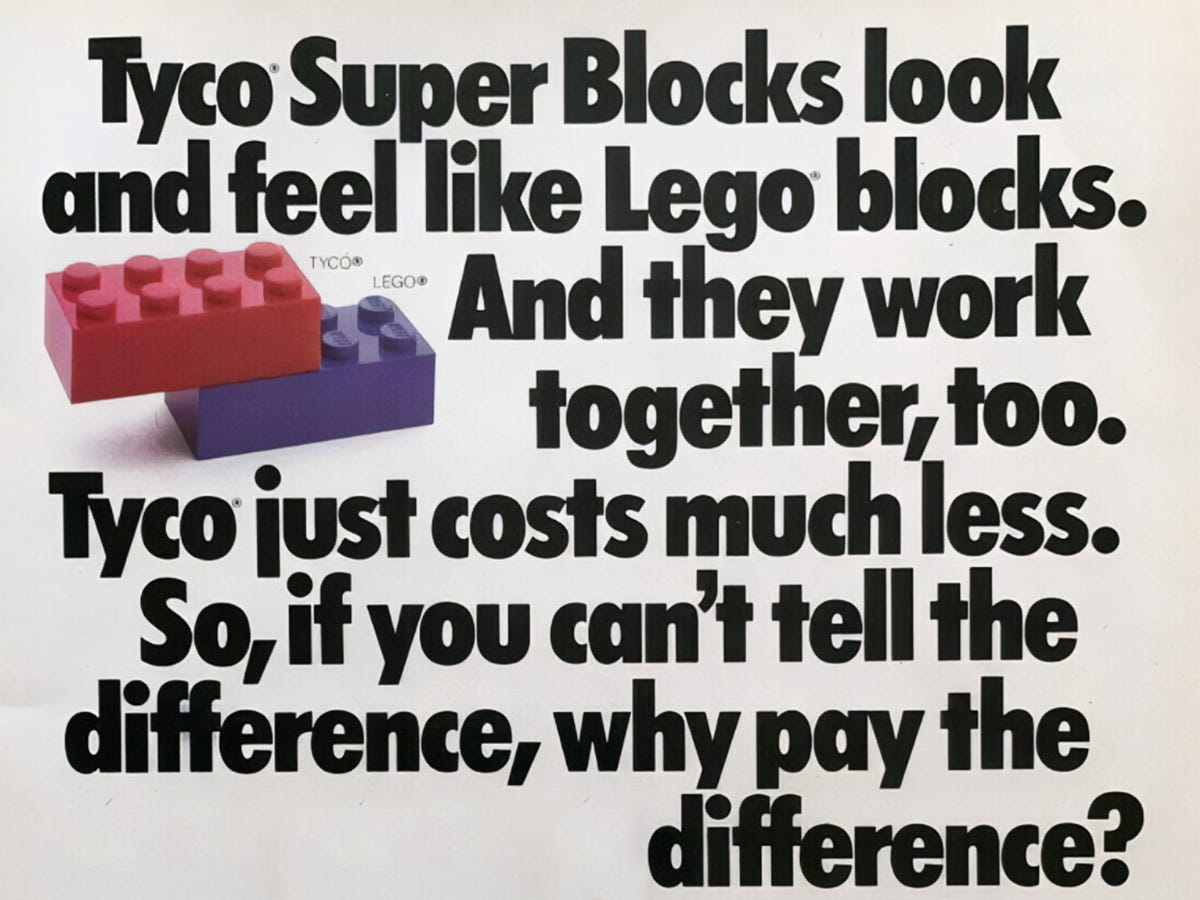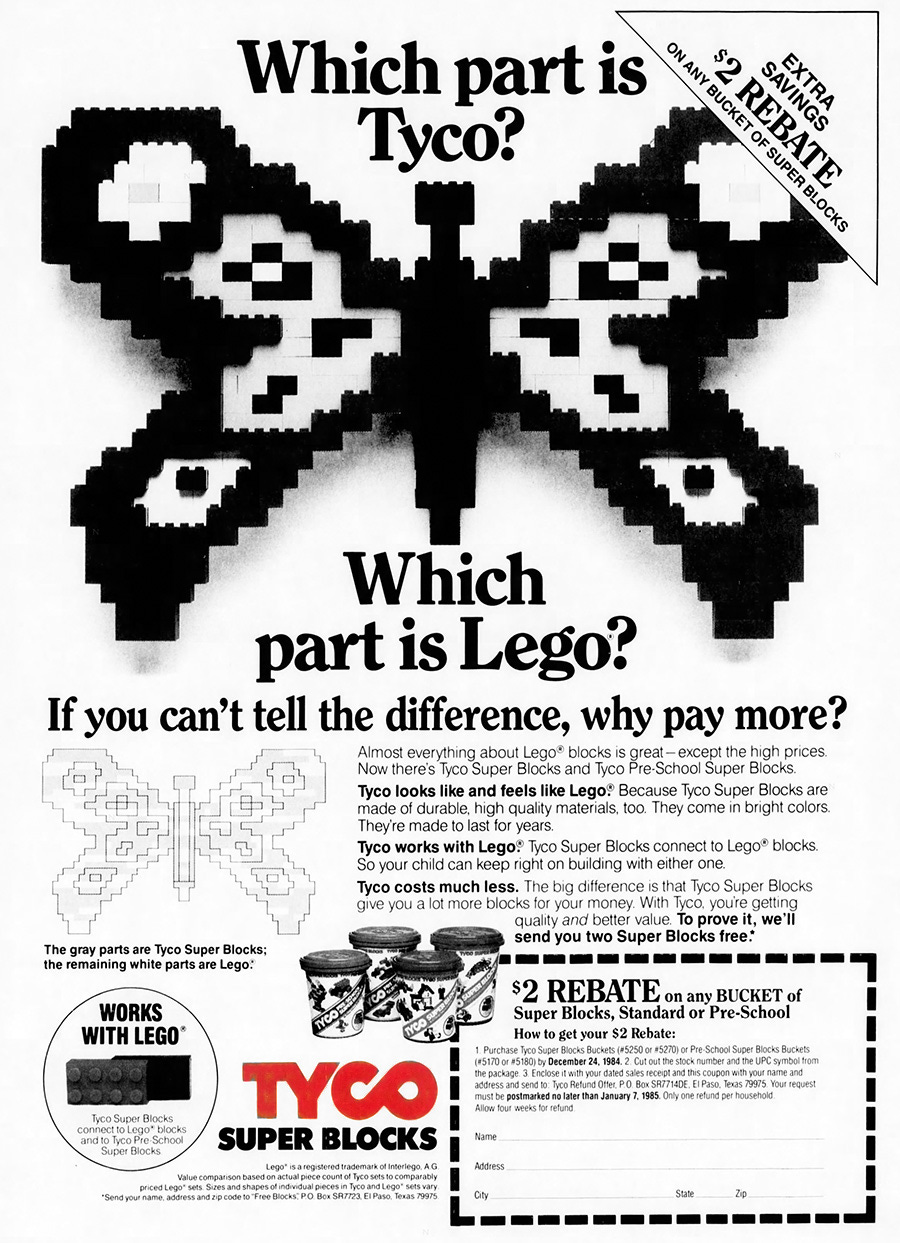Lego vs. Tyco: The Battle of the Bricks
Lego is maybe the most well-known brick building system in the world, but when the patents expired, the clones came to market and lawsuits would follow.
Lego, the iconic Danish toy company known for its colorful interlocking bricks, has faced numerous legal challenges over the years from clone manufacturers who produce similar products. These legal battles have centered around issues such as patent and trademark infringement, with Lego often seeking to protect its intellectual property rights. Let's take a look at one of the more notable lawsuits Lego has been involved in against the company Tyco.
The battle with Tyco was one of Lego’s earlier legal challenges to try to curb imitation after their patents has expired in 1978. In 1984, Tyco started to produce its own line of interlocking bricks, they called “Super Blocks.” Of course, to roll it out they hired someone who could really move product to kids, Betty White.
Okay, so maybe they were trying to appeal to adults with this commercial. And Betty’s message was the big push with Super Blocks. Most of their advertising was aimed at parents and centered around cost. Why pay more for Lego, when compatible Super Blocks were more affordable? This strategy, was clever, but it also set the stage for a lawsuit between the two companies.
Tyco, a company that was based in New Jersey, had mostly been known for making models and toy trains. That changed when they got into the block business. By 1986, Super Blocks accounted for almost 25% of the company’s annual sales of $87.7 million. It was just a small segment of Lego’s $600 million sales that year, but it was a threat. The U.S. was important to Lego, and Tyco had grabbed 20% of the market.
Tyco wasn’t the only competitor to jump into the market. Products like Loc Blocs and Coko blocks were finding their way into stores. But the Super Blocks sales strategy was aggressive with slogans like “If you can’t tell the difference, why pay the difference?” And advertising, like the one featuring Betty White, that directly invoked the Lego name.
Maybe it was just because I lived in the state where Tyco was based, but I remember hearing about the lawsuit at the time. As is typical for a kid, I decided that it was essential for me to pick a side, and I was team Lego all the way. After all, they had made the space sets that had brought me great joy.
In the summer of 1984, Lego initiated a lawsuit against Tyco in Hong Kong, where molds of the bricks were made. They contended that the designs were derived from copied drawings. That case was ruled in favor of Lego, but on appeal, Tyco only had to pay legal fees. Still, the threat posed by these lawsuits hung over Tyco’s future.
So in August 1984, Tyco pre-emptively filed the first U.S. lawsuit. They wanted the court to uphold their rights to manufacture the look-a-like bricks. Filing in New Jersey was also part of the company’s strategy to give them a venue close to home, since Lego tended to file suits in locations that were not convenient to the defendant.
The case had two major points:
Tyco’s advertising claims that the Super Blocks are cheaper than Lego, but of the same quality. And that they are currently, and always will be, compatible with Lego Products.
That the shape of a Lego is an “implied trademark.” Yes, the patents have expired, but Tyco, by producing blocks that are so similar, is confusing buyers.
The case would finally be settled in 1987, when the US District Court ruled that Tyco could keep making Super Blocks. Though, they had to stop using the Lego trademark and claiming that their products were "Lego, but only cheaper." Both companies saw this ruling as a victory. Lego got them to stop using their brand in advertising, and Tyco could continue to manufacture and sell Super Blocks.
The real winner though in such a lawsuit is the consumer. Not only did they now have more building bricks to choose from, they would also benefit from the increased competition. Need tangible proof? If Super Blocks has been shut down, we may have never enjoyed the super cool Super Blocks Military Series. A set of toys I don’t think Lego would have made.
This was not the only lawsuit Lego would be involved with to try to hold back a wave of copycat products. Over the years they have engaged in litigation with mixed success for their bricks and their very popular minifigs. The clones are out there, but Lego continues to hold onto the market through a savvy combination of lawsuits and their imaginative product development. The latter has been the more potent force for the brand, as it opened up new markets for the company and pushes the product in new directions. But even a bottomless well of creativity won’t keep companies from taking things to the courts.





I'm going to combine my Tyco military set with my Lego Titanic model and make a really cool naval battleship scene.
I don't remember the LEGO battle with Tyco, but I do remember receiving Tente blocks from a well-meaning relative. They were smaller and incompatible with LEGO. I think I had a battleship and maybe an aircraft carrier. They were fun, but you had to be careful not to mix them into your LEGO stash.
Dollar General, Big Lots, and a few other discount stores have knock-off LEGO-but-not-LEGO sets. I don't know what the quality is like, but they are always priced 1/3 the cost of official LEGO sets which I'm sure makes them very appealing to parents and grandparents.